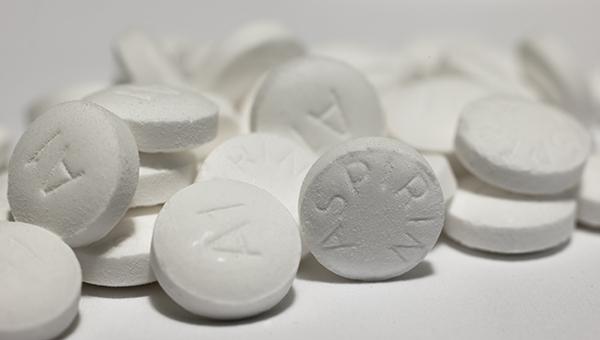USPSTF at Last Takes Tougher Stance on Aspirin in Primary Prevention
The advice joins a range of prior documents, but cardiologists stress that aspirin is still needed for those who already have CVD.

It’s not breaking news for most people in the field that aspirin shouldn’t play a major role in preventing new-onset cardiovascular disease, but the United States Preventive Services Task Force (USPSTF) has grabbed headlines for finally toughening its stance on the issue.
In draft recommendations, posted online this week and focused only on patients who do not already have heart disease, the group says that people age 60 or older should not start aspirin for primary prevention of CVD. The decision to initiate aspirin in those between 40 and 59, meanwhile, should be made on a patient-to-patient basis and only if their individual 10-year risk of CVD is 10% or higher.
The last update from the USPSTF, back in 2016, took a slightly more liberal approach in that it used age 70 as the cutoff while also recommending that aspirin could be initiated for the prevention of colorectal cancer—that advice has now been reversed.
But for many observers, the 2021 USPSTF advice is too little, too late. A range of trials in different patient subsets have already closed the lid on aspirin for primary prevention, among them ASPREE in elderly patients, ARRIVE in those at moderate risk for disease, and ASCEND in patients with diabetes, as well as a comprehensive meta-analysis.
I am a big fan of USPSTF but the lack of benefit in aspirin use for primary prevention of cardiac events was clear in 2018 with the publication of 3 RCTs.
— John Mandrola, MD (@drjohnm) October 12, 2021
We shouldn’t have to wait three years for trial results to become “news”
What’s more, many other health organizations have already taken a tougher stance on aspirin as a means to prevent CVD onset, making these draft guidelines seem out of step with current practice. The US Food and Drug Administration issued a statement back in 2014 clarifying that, in its review of the evidence, aspirin is not supported for heart and stroke prevention. The American College of Cardiology/American Heart Association 2019 guidelines for primary prevention concluded that aspirin “should be used infrequently in the routine primary prevention of ASCVD because of lack of net benefit.” And most recently, the 2021 European Society of Cardiology CVD prevention guidelines, released in August, conclude that aspirin “should not be given routinely to patients without established ASCVD,” although the benefits might outweigh the risk in “some” high- or very-high-risk patients, most notably those with diabetes.
As such, the new USPSTF document is bound to attract some derision, or at least apathy, during its public comment period, which is open until noon ET on November 9, 2021.
Truth! Also: These are DRAFT recommendations of 3 year old data! Uh, hello @nytimes
— Josh “It goes in your arm” Beckman (@JoshuaBeckmanMD) October 15, 2021
Also: This is not a public comment period. This is a get comments from the public and hide the comments period. What is the @USPSTF afraid of?
Transparency please! pic.twitter.com/MUhPXpblLj
In its “recommendation summary” the draft document states: “The decision to initiate low-dose aspirin use for the primary prevention of CVD in adults ages 40 to 59 years who have a 10% or greater 10-year CVD risk should be an individual one. Evidence indicates that the net benefit of aspirin use in this group is small. Persons who are not at increased risk for bleeding and are willing to take low-dose aspirin daily are more likely to benefit.” Of note, the 2016 update did not recommend aspirin for adults younger than 40 without prior CVD.
And for adults 60 and older, the USPSTF now “recommends against initiating low-dose aspirin use for the primary prevention of CVD.”
An accompanying evidence review notes that 13 “fair- to good-quality randomized, controlled trials” of aspirin for prevention of CVD were included for analysis, amounting to a total of 161,680 patients. The pooled data pointed to reductions in major CVD events (total MI, total stroke, CVD mortality) of 10%, in MI of 11%, and in ischemic stroke of 18%, but no overall differences in CVD mortality or all-cause mortality. On the other hand, intracranial bleeding events were increased by 31% and extracranial bleeding events by 53%.
For colorectal cancer, the reviewers concluded that there was “little new evidence” to support aspirin in this setting, and what is available is of “low strength” to support a reduction in these types of cancer with any dose of aspirin.
No John, evidence for lack of benefit in primary prevention was clear in 2003 (AdCom) when FDA denied approval and again in 2014 when they formally released their response to Bayer. USPSTF is late to the game c/w FDA, CDC, NHLBI, ESC, CCS!https://t.co/2IQ5hP23zX
— Sanjay Kaul (@kaulcsmc) October 12, 2021
“Despite this accrual of new evidence, findings for CVD outcomes and bleeding harms were remarkably similar to our prior review,” authors of the evidence summary conclude. “In both low-dose and all-dose analyses, aspirin was associated with statistically significant relative risk reductions and small absolute risk reductions of up to 2.5% for major CVD events in primary prevention populations. These benefits were offset by statistically significant relative risk increases and small absolute increases of up to 1.0% for major bleeding harm.”
Translating the Message
The message that an aspirin a day will not necessarily keep the doctor away—or that for a different group of patients it is, in fact, medically necessary—can be lost in translation when aspirin is available over-the-counter around the world.
Jeffrey Berger, MD (NYU Langone Health, New York, NY), called the new USPSTF guidance “very consistent with what we’ve been hearing over the last decade,” and said he hopes it will remind patients that this is a potent drug, even if its impact in the primary prevention of CVD is small.
“It is sold over-the-counter, so people think, oh, it’s not a real drug. I think this is a reminder that, in fact, it is a real drug with real, consequential side effects,” Berger commented.
On the other hand, he continued, “we do need to emphasize that the [USPSTF] guidelines were only for the prevention of a first heart attack or stroke, for primary prevention. If somebody is on aspirin because they already have established heart disease or vascular disease, those patients, if their doctor told them to be on aspirin, should remain on it. Nobody should stop their drug, in my opinion, without having a discussion with their healthcare provider.”
Also commenting on the USPSTF stance for TCTMD, Ann Marie Navar, MD, PhD (UT Southwestern Medical Center, Dallas, TX), said that she has “no objections” to the USPSTF recommendations but worries that some of the news coverage of the update has been “very problematic.”
When the media makes this seem like some major new shift with vague headlines that can mislead patients who have a real need to take aspirin, there are consequences. Ann Marie Navar
“Some headlines did use the term ‘primary CVD prevention,’ but I don’t think the general public is familiar with that term,” she said in an email. “I have already heard of patients with heart disease who think they now need to stop their aspirin based on the news coverage. Many cardiologists are fielding lots of phone calls about this. I worry about the volume of calls my colleagues are fielding, and I worry more about the patients that are NOT calling and are just stopping their aspirin.”
And the fact remains, this guidance doesn’t represent new news, she stressed. “When the media makes this seem like some major new shift with vague headlines that can mislead patients who have a real need to take aspirin, there are consequences.”
Complicating matters over the past year and a half is the COVID-19 pandemic. When it became clear early on that SARS-CoV-2 infection could manifest as micro- and macrovascular clotting, aspirin was widely touted as a good, cheap candidate for preventive medicine. But while a number of smaller trials have hinted at benefit, the larger RECOVERY trial, which enrolled nearly 15,000 people hospitalized with COVID-19, found that aspirin 150 mg once daily was no better than placebo for reducing mortality at 28 days. More recently, the ACTIV-4b trial found no benefit to aspirin or apixaban in preventing cardiopulmonary outcomes versus placebo among stable, nonhospitalized patients.
PSA: THE #USPSTF RECOMMENDATIONS ON #ASPIRIN DO NOT APPLY TO YOU IF YOU HAVE HEART DISEASE. Hearing of people misguided by vague, catchy headlines already…we have some damage control to do, @American_Heart @ASPCardio pic.twitter.com/4qB68m5OYh
— Ann Marie Navar (@AnnMarieNavar) October 14, 2021
Given the very low event rates seen among COVID-19 patients recovering at home in ACTIV-4b, which led to the trial being halted early, stable, nonhospitalized patients can be somewhat reassured that their risk of thrombotic events is actually quite low.
“There's a lot data out there to suggest that that platelets would be a good therapeutic target,” Berger said. “There is very little data suggesting that antiplatelet therapy actually works.”
Berger himself is presenting the ACTIV-4a late breaker at the upcoming American Heart Association Scientific Sessions looking at P2Y12 inhibitors in noncritically-ill hospitalized COVID-19 patients.
Shelley Wood was the Editor-in-Chief of TCTMD and the Editorial Director at the Cardiovascular Research Foundation (CRF) from October 2015…
Read Full Bio




scott baron